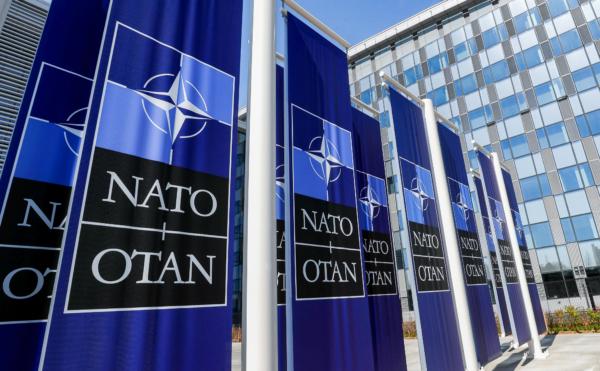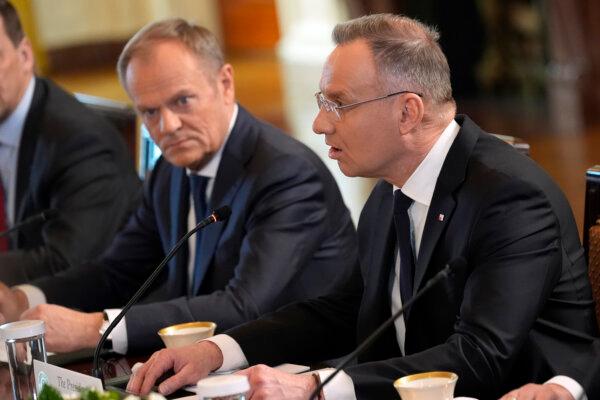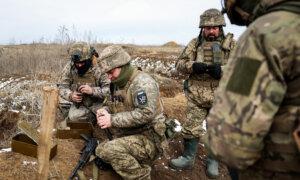Polish President calls on NATO members to increase defense spending to 3 percent of GDP while Poland commits to spending almost 4 percent.
President Joe Biden hosted Poland’s President Andrzej Duda and Prime Minister Donald Tusk at the White House to discuss Poland’s commitment to NATO, the military cooperation between Poland and the United States, and financial support for Ukraine.
At the meeting, President Duda proposed increasing the defense spending of all NATO members from the current 2 percent of Gross Domestic Product (GDP) guideline to 3 percent in response to the growing threat from Russia.
The pledge of 2 percent was sufficient 10 years ago when it was introduced, President Duda said. “Now 3 percent is required in response to the full-scale war, launched by Russia right beyond NATO’s eastern border.”
President Duda stressed that Poland allocates about 4 percent of its GDP for military expenditures and the modernization of its army. Mr. Tusk said that Poland plans to increase its defense spending to 4.2 percent of GDP in 2024.
Russian aggression against Ukraine showed that the United States is and should remain the leader in security matters, President Duda said. “However, other NATO countries must take greater responsibility for the security of the entire Alliance.”
The meeting was held on the 25th anniversary of the accession of Poland to NATO, along with the Czech Republic and Hungary. These three countries joined NATO nearly 10 years after breaking free from Soviet domination, effectively shifting NATO’s border eastward.
President Biden announced during the meeting that the United States would proceed with a new $2 billion direct loan to Poland. This loan is intended to finance the purchase of 96 Apache helicopters, equipping Poland with cutting-edge defensive capabilities, supporting American jobs, and bolstering the U.S. defense industry.
At a press conference after the meeting, Mr. Tusk said that he had stressed to President Biden the importance of Congress unblocking U.S. aid to Ukraine.
Mr. Tusk warned House Speaker Mike Johnson (R-La.) that it not only matters to America but also impacts “the fate of millions of people” and “thousands of lives” depend on him allowing a vote on the aid.
Mr. Johnson called on the Senate in February to pass a budget bill that would include measures to stop the influx of illegal immigrants through the open southern border. The budget bill passed by the Senate included aid for Ukraine but stipulated that the border could only be closed if the number of illegal crossings exceeded certain thresholds, which effectively legalized certain quotas of illegal immigration.
The bill has been stalled in the House by Republican lawmakers who oppose it due to the lack of U.S. border security provisions and the extra aid to Ukraine. As a result, the deal on extra aid to Ukraine and other nations remains at a stalemate.
NATO Contribution

In 2014, NATO members reached an agreement that each of them should spend 2 percent of their Gross Domestic Product (GDP) on defense, but not all members complied with this requirement.
According to NATO’s estimates, only 11 out of 31 NATO members met this target in 2023. These countries include the United States, the Baltic states, Eastern European post-communist countries close to Russia, Greece, Finland (which joined the alliance in April 2023), and the UK.
While the United States traditionally spends the highest percentage of its GDP on defense among NATO members, last year, it was surpassed by Poland, which allocated 3.9 percent. In 2023, the United States spent 3.49 percent, but it still bears the largest burden in dollar terms, accounting for more than two-thirds of the total NATO defense expenditure.
Germany gradually increased its spending, reaching an estimated 1.57 percent in 2023.
Poland’s Political Landscape

President Biden invited President Duda and Mr. Tusk, two political opponents, to Washington at the same time.
President Duda was formerly a member of the conservative, right-wing Law and Justice (PiS) party, but after winning the 2015 election, he resigned his party membership. When running for re-election in 2020, President Duda received official support from his former party.
The PiS had governed Poland since 2015 but was defeated by an opposition coalition in the parliamentary elections in October 2023.
A coalition of the liberal, centrist Civic Coalition (KO), center-right Third Way (TD), and left-wing New Left (NL) won a combined majority in the elections, and Mr. Tusk, a leader of the KO, was officially installed as prime minister in December.
Mr. Tusk, who is strongly pro-European Union, is a former president of the European Council and served earlier as the Polish prime minister.
Mr. Duda, as the president, wields the constitutional power to veto legislation. His term ends in 2025.
Petr Svab, Naveen Athrappully, and Katabella Roberts contributed to this report.
Original News Source Link – Epoch Times
Running For Office? Conservative Campaign Consulting – Election Day Strategies!


